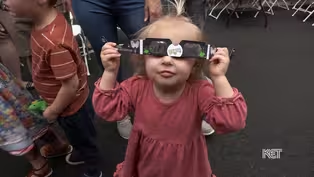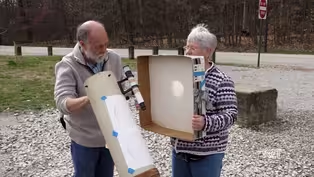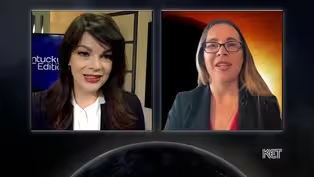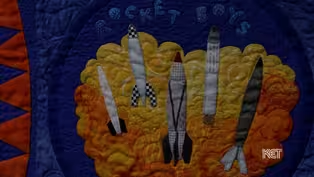Eclipse 2024: A KET Special Report
Kentucky Mesonet and Climate Center Track Weather Changes Created by the Eclipse
Clip: 4/8/2024 | 3m 2sVideo has Closed Captions
Kentucky Mesonet and Climate Center track weather changes created by the eclipse.
Scientists from the Kentucky Mesonet and Climate Center were tracking weather changes created by the eclipse.
Problems playing video? | Closed Captioning Feedback
Problems playing video? | Closed Captioning Feedback
Eclipse 2024: A KET Special Report is a local public television program presented by KET
Eclipse 2024: A KET Special Report
Kentucky Mesonet and Climate Center Track Weather Changes Created by the Eclipse
Clip: 4/8/2024 | 3m 2sVideo has Closed Captions
Scientists from the Kentucky Mesonet and Climate Center were tracking weather changes created by the eclipse.
Problems playing video? | Closed Captioning Feedback
How to Watch Eclipse 2024: A KET Special Report
Eclipse 2024: A KET Special Report is available to stream on pbs.org and the free PBS App, available on iPhone, Apple TV, Android TV, Android smartphones, Amazon Fire TV, Amazon Fire Tablet, Roku, Samsung Smart TV, and Vizio.
Providing Support for PBS.org
Learn Moreabout PBS online sponsorshipScientists from the Kentucky Maisonette and Climate Center were also tracking weather changes created by the eclipse.
We caught up with them this morning in Ballard County, which was also in the path of totality.
Earth is in a really unique place to see eclipses because the Earth is just the right distance from the sun.
The moon is just the right size.
And if any of those things changed, we wouldn't be able to see the eclipse that we do today.
This is the spot of Kentucky that will have the longest duration in totality this afternoon, 2 minutes and 45 seconds.
And by totality, we're talking about the moon's disk completely covering that of the sun.
There's a lot we don't know about how the atmosphere responds to solar radiation and eclipses are unique because they provide like a quick window of night.
And so in a very short period of time, we can see how quickly the atmosphere responds to those changes in solar radiation.
We have three temporary measurement stations, one of which is located here on the property next to the cross.
And we live and we are measuring different variables that are likely to change throughout the course of the afternoon during peak time for this eclipse.
One of those being temperature.
We saw a drastic drop in surface temperatures back in 2017 during that total solar eclipse event, especially across portions of western and southern Kentucky.
We're also measuring wind speed along with wind direction as that could change, especially as the sun becomes obscured.
Relative humidity is being measured.
Solar radiation, we are likely to see a big dip in that this afternoon.
And we're also taking in soil moisture measurements down to two centimeters below the surface.
Part of this is for research purposes.
We're going to go back after the fact and see how much these weather parameters have changed during the course of the eclipse from the beginning of the partial phase to totality to the end of the partial phase.
Where we've deployed three temporary stations here in Ballard County and different spots around the county.
And one of the things we're interested in learning is just how the eclipse impacts those stations differently.
Some are located right here next to the Mississippi River.
Others are located more inland in the county.
And what we'll see is, is there a difference in how they respond to the eclipse?
They're each in a different, slightly different landscape with different soil moisture, different vegetation, and we'll see how that impacts the temperature changes and some of the wind changes that we really expect to see when the eclipse happens.
The Kentucky Basin, that is a network of 83 permanent weather observation stations throughout the U.S. that gather real time weather, water and climate data.
You can see the weather data collected during the eclipse at k y maisonette dot org.
Device Tested in Kentucky Allows Blind or Visually Impaired to Experience Solar Eclipses
Video has Closed Captions
Clip: 4/8/2024 | 4m 30s | Device tested in Kentucky allows blind or visually impaired to experience solar eclipses. (4m 30s)
In the Path of Totality, Paducah celebrates the 2024 Total Solar Eclipse Event
Video has Closed Captions
Clip: 4/8/2024 | 2m 23s | How the city of Paducah is celebrating the historic 2024 solar eclipse event. (2m 23s)
Kentucky Breweries Partner to Make Special Beers for the 2024 Solar Eclipse
Video has Closed Captions
Clip: 4/8/2024 | 2m 51s | Kentucky breweries partner to make special beers for the 2024 Solar Eclipse. (2m 51s)
Meet a Kentucky Stargazer Who was Ready to Go the Distance for the Eclipse
Video has Closed Captions
Clip: 4/8/2024 | 2m 45s | Meet a Kentucky stargazer who was ready to go the distance for the celestial show. (2m 45s)
NASA’s Eclipse Experiments and How We Might Benefit Down Here on Earth
Video has Closed Captions
Clip: 4/8/2024 | 3m 38s | NASA’s eclipse experiments and how we might benefit down here on Earth. (3m 38s)
Why An Astronaut's Work is Being Showcased at the National Quilt Museum
Video has Closed Captions
Clip: 4/8/2024 | 4m 1s | Why an astronaut's work is being showcased at the National Quilt Museum. (4m 1s)
Providing Support for PBS.org
Learn Moreabout PBS online sponsorship
- Science and Nature

Explore scientific discoveries on television's most acclaimed science documentary series.

- Science and Nature

Capturing the splendor of the natural world, from the African plains to the Antarctic ice.












Support for PBS provided by:
Eclipse 2024: A KET Special Report is a local public television program presented by KET





